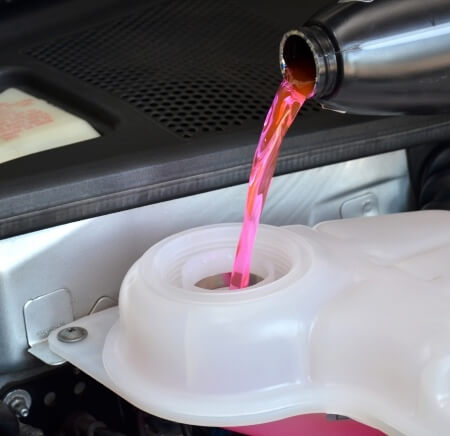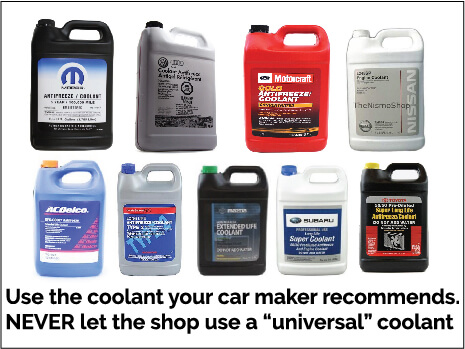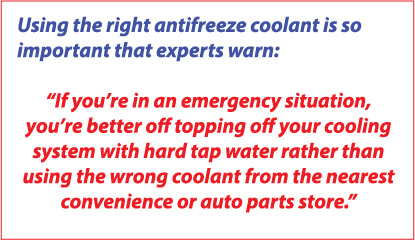What is universal coolant and can you really use it in any engine?
What is universal coolant?
Is it really all makes, all models?
No, it’s not. If a single coolant could actually work on all makes, all models, then carmakers have wasted decades trying to find just the right coolant formula for their engines.
Universal coolant is basically a scam
Coolants are designed to remove heat from the engine, prevent freezing in cold weather, prevent corrosion, and lubricate the water pump. But engines are made with many different metals; cast iron, aluminum, aluminum alloys, magnesium, copper, brass, and plastic, rubber and all kinds of gasketing materials. There is no one single coolant that can possible do what coolant is supposed to do and still be compatible with all those different materials.
What’s in antifreeze coolant?
The base fluid in all coolant is monoethylene or polyethylene glycol. That fluid is compatible with all engine materials. The Glocol makes up about 95% of the coolant. The other 5% is the additive package; corrosion inhibitors to protect against metal corrosion, galvanic action and cavitation erosion and the inhibitors used must also be compatible with rubber and plastic seals, gaskets and fittings.
What’s the difference between antifreeze and coolant? See this post
Most late model vehicles use an organic acid additive package
What is Organic Acid Coolant Technology?
Organic Acid coolant works differently than silicate/phosphate coolants. Silicate and phosphate lay down a physical film layer of corrosion protection. Organic acid technology, prevent corrosion on a molecular level, not a film layer. To achieve this, the antifreeze contains metal ions that precipitate on cathodic metal within the engine and cooling system. Some examples of inorganic cathodic inhibitors are the ions of magnesium, zinc, and nickel.
Types of organic acid coolants
Organic Acid Technology OAT— no silicates. Often contain 2-EHA and /or Sebacate for corrosion protection
Hybrid Organic Acid Technology OAT— OAT plus a low dose of silicate.
Nitrited Organic Acid Technology (NOAT)—OAT with no silicates or phosphates
Nitrited Molybdate Organic Technology (NMOAT) – Contains Molybdate and used mainly with diesel engines.
Poly Organic Acid Technology (POAT) – Variation of OAT
Common organic corrosion inhibitors
Organic acid corrosion (OAC) inhibitors or organic acid technology (OAT) coolant can act as cathodic or anodic inhibitors, or a combination of the two. Common organic acid compounds are: 2-ethylhexanoic acid, sebacic acid, azelaic amines, urea, Mercaptobenzothiazole (MBT), benzotriazole e toliotriazol, aldehydes, heterocyclic nitrogen compounds, sulfur-containing compounds and acetylenic compounds and also ascorbic acid, succinic acid, tryptamine, caffeine and extracts of natural substances. OAT coolants also contain an azole additive as a copper corrosion inhibitor.
Organic acid compounds combine with the metals to form a hydrophobic protection barrier that prevent corrosion.

Organic acid antifreeze comes in different colors
They offer much longer life than inorganic inhibitors, but take much longer to form a protective film than inorganic inhibitors.
Organic acid inhibitors protect aluminum and cast iron components. They are non-abrasive, so they don’t damage water pump seals. However, the exact formulation MUST be compatible with the plastic and rubber components used in a particular engine/cooling system combination.
Since car makers vary the types of rubber and plastics by year, make, model and engine, there are simply too many variations for any antifreeze manufacturer to claim their product works in all makes, all models and is universal.
Some car makers recommend Hybrid Organic Acid (HOAT) antifreeze formulas that use an organic anion as the primary corrosion inhibitor, along with an inorganic corrosion inhibitor. HOAT, for example, may use organic acid with a low silicate inorganic corrosion inhibitors. The inorganic corrosion inhibitor provides rapid passivation until the organic acid portion can take full effect. Yet the low silicate concentration doesn’t damage water pump seals. HOAT coolants also contain an azole additive as a copper corrosion inhibitor.
How can antifreeze manufacturers claim their product is all makes, all models or universal?
They really can’t. Generally, all makes all models universal antifreeze is 96% ethylene glycol and just 2 to 5% inhibitors. Since the product is billed as all makes, all models, it’s can’t possibly be vehicle specific, so it’s really a compromised product that provides LESS corrosion protection than the factory formula. To cover their bases, these all makes, all models universal antifreeze formulas use a small amount of every inorganic inhibitor, which causes corrosion by itself because the inhibitors interact poorly with each other.

In fact, many car makers have issued service bulletins warning not to use the wrong antifreeze just for this reason. In addition to interactions between inorganic inhibitors, there’s also the issue of incompatibility between the all makes, all models universal antifreeze and the rubber and plastics used in the engine and cooling system components.
So mixing different types of antifreeze coolants or add the wrong antifreeze coolant can actually CAUSE corrosion, pitting of water pump, rust formation in radiator and total cooling system degradation.
Using the wrong antifreeze coolant can cause extensive cooling system damage
Shops like to use all makes, all models antifreeze coolant because they don’t have to stock vehicle specific antifreeze or tie up their repair bay waiting for an antifreeze delivery from the local dealer. However, if a shop uses all makes, all models universal antifreeze coolant in your vehicle and it’s not fully compatible the damage won’t show up for at least a year. By then you won’t connect the dots to realize that the coolant flush with the wrong coolant is what damaged your radiator, heater core or water pump. Good luck pointing the finger at the shop at that point!
Why do shops and parts stores sell and use a universal or multi-vehicle coolant?
Simple, shops and auto parts retailers don’t have the shelf space to stock every car maker’s specific type of coolant. Many universal or multi-vehicle coolants have a neutral color, neither bright green nor orange. If the vehicle is just low on coolant and you’re using a universal coolant to top off the level, you probably won’t compromise the anti corrosive capabilities since the system is already passivated. However, there’s no way of knowing if the new universal coolant is compatible with the corrosion additive package which could result in corrosion inhibitor drop out.

Which water to use when mixing antifreeze concentrate or topping off the system?
Ask any car buff which water to use when mixing antifreeze concentrate or topping off a cooling system, and they’ll tell you to use distilled water. Well, that’s certainly better than hard tap water. But distilled water can still contain minerals that can react with metal and your antifreeze to form corrosion and deposits. You want de-ionized/de-mineralized water.
Other antifreeze additives
In addition to corrosion inhibitors, all antifreeze formulas contain an anti-oxidant, anti-cavitation and anti-foaming additive, along with a identifying dye.
What determines antifreeze life?
Ethylene Glycol never wears out, but the corrosion inhibitor,anti-oxidant, anti-cavitation and anti-foaming additives do wear out. How long the antifreeze lasts is directly related to type and amount of the corrosion inhibitor in the formula. If you don’t change your antifreeze coolant at the recommended intervals, you risk causing extensive and expensive damage to your radiator, heater core, heater tubing and water pump.
©, 2017 Rick Muscoplat
Posted on by Rick Muscoplat
